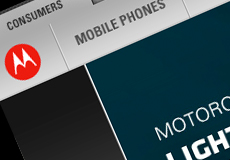By
Chris CastanedaAugust 6, 2013
Motorola Mobility says it will not initially allow third party developers to create applications that use the contextual computing capabilities of its new Moto X Android smartphone, which is a feature that makes the phone distinct from its competitors. According to analysts, the move is perceived as an example of how Motorola is protecting what it thinks is its competitive advantage. The company aims to have the Moto X do more, but more efficiently. Continue reading Moto X Contextual Computing Closed to Third-Party Developers
Google’s I/O developers conference kicks off tomorrow with a three-hour keynote from the Moscone Center in San Francisco. During the three-day event, the company is expected to announce an update to its Android mobile operating system and an updated version of its 7-inch Nexus 7 tablet (and possibly a new 11-inch model), while there has been speculation that Google may also unveil a new smartphone from Motorola, a new design for Google Maps, new Chrome features and more. Continue reading New Products and Updates: Google I/O Kicks Off Tomorrow
By
emeadowsMarch 29, 2013
According to Motorola Mobility’s recently released Fourth Annual Media Engagement Barometer, consumers are watching a great deal of video on multiple screens, but are frustrated with the process. Time-shifting technology and mobile devices have led to a significant shift in global media consumption. The Engagement Barometer is an independent global study of video consumption habits among 9,500 consumers in 17 countries. Continue reading Motorola Mobility Report: More Video, but Viewers Frustrated
By
Paula ParisiJanuary 6, 2013
The smartphone continues to grow in popularity and power as the always-on processing unit of choice. Quad-core units, phones with screen displays of 1080p and outsized “phablets” are expected to take center stage at the 2013 International CES. There’ll be a wow-factor, like the 5.5-inch flexible screen Samsung prototype, and a now-factor, like wireless pocket chargers from Energizer and Lilliputian that provide up to 20x life. Continue reading CES 2013: Phones to Tout Quad Cores, 1080p and Flexible Screens
By
emeadowsDecember 17, 2012
As the Google TV platform fails to gain traction, Google is looking to sell its Motorola Home Business, which is responsible for building set-top boxes for cable providers. The Motorola cable box business was acquired by Google for $12.5 billion last year. According to Bloomberg, Google has received multiple offers, the most compelling coming from Arris Group Inc. and Pace Plc. Google reportedly wants to sell in order to focus on its high-end smartphone business to ramp up competition with Apple. Continue reading Google Fields Bids from Arris and Pace on Motorola STB Business

